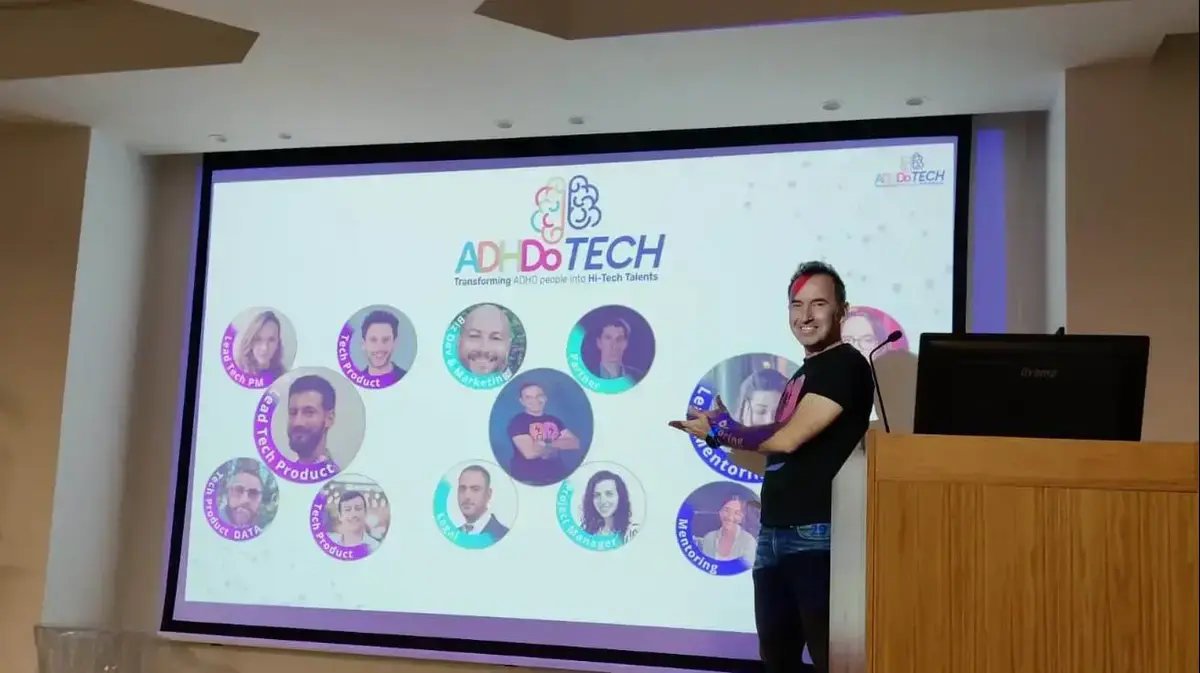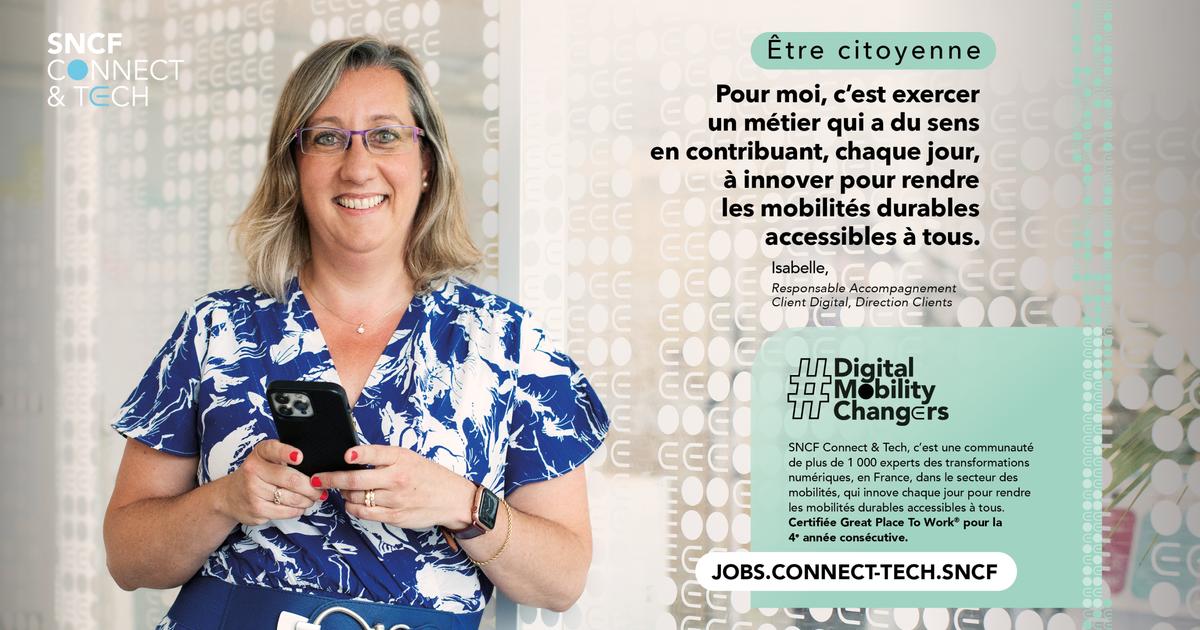David Tzur lectures as part of the mentoring program for people with ADHD. (Photo: ADHDdoTech)
David Tzur had an extensive career in high-tech before being diagnosed, at the age of 40, with ADHD. Previously, he served as a QA developer and systems analyst, founded and led automated testing at 8200 and was sent to Africa by Amdocs as a systems analyst. For the past 6 years he has been engaged in product management. Although he has already been discharged from service, he continues to serve as a major in the reserves in Unit 8200 "because I believe in a startup called the State of Israel," he says. The rest of the time, he does professional mentoring in the field of product management for juniors, and volunteers as a professional mentor in GIVE & TECH, Achari-Tech and Tapuach associations, which work to reduce the technological gaps between the periphery and the center.
He came to the diagnosis of ADHD following in the footsteps of his eldest son. According to him, "The whole issue is very publicized in the world of education, in the army and in the university, but in the world of employment there is almost no reference to attention disorders. It should be remembered that this is a neurological disorder that does not pass over time and cannot be 'cured'. What changes is coping, so people try to adapt all kinds of habits, and they don't always succeed."
When vision becomes reality
"Twelve months ago, a boy with ADHD committed suicide in our community. I knew him personally because my wife and I helped his family get into this field. It shook me and made me take action. I decided to set up a project to promote people with ADHD in high-tech and called it ADHDoTECH. His goal is to help people with ADHD enter the high-tech industry and become leading talents in the industry through proper coping with the disorder."
In the first step, Tzur opened a company profile on LinkedIn and "it attracted good people who joined along the way." Today, 12 months later, the organization has 11 partners and about 4 volunteers, high-tech professionals and students in high-tech professions with attention disorders. The common denominator of all of them, according to Tzur, is faith and passion: "They see their disorder as an advantage and a gift. They have learned firsthand that there are many ways to cope and they want to help the younger generation realize their potential in the industry."
"We recruited 35 mentors in senior positions in high-tech who are in a good place with their disorder, we trained them and ran a small program to help young workers in the industry who are coping with attention and concentration difficulties.
Today, the venture operates within the framework of the "Streamlining" Fund and in the next stage will open as a subsidiary for the benefit of the public. The program, which consists of 15 weekly sessions, was developed on the basis of user interviews and research questionnaires designed to understand the difficulties faced by high-tech workers coping with ADHD. Each week we discuss a specific topic that emerged from our research and adopt tactics to help adapt new habits and better cope with difficulties.
At the same time, the organization is in the advanced stages of developing continuing education for managers that will provide knowledge, tools and strategies for managing employees with attention deficit hyperactivity disorder. The course will equip the organization with options for optimal adaptations of the physical and organizational environment to the prosperity of employees with ADHD, and is consistent with the growing investment by organizations in employee welfare, management development and realizing the potential of hidden talent in the organization.
What is important to you that people know about ADHD in high-tech?
"Throughout my career I met many friends and colleagues with ADHD, some coping with it better than others, but all of them had difficulties that were not recognized or addressed," Tzur recalls, testifying about himself: "I am an extrovert in relation to my attention disorder. I always showed up at job interviews with a shirt that said ADHD because I saw it as an advantage and I was proud of the benefits of it.
Unfortunately, we discovered that the younger generation tends to hide their ADHD and do not tell about it in the workplace. They don't put things on the table and have to deal with the difficulty on their own. Therefore, one of our goals is to also talk about the benefits of ADHD, raise awareness of the issue, help people surface the disorder, discover that they are not alone, and create a safe environment for employees to 'come out.'"
What can managers do to nurture and retain talent with ADHD?
"Different employees have different needs and skilled managers know how to adapt their management so that the employees express their maximum abilities and advantages. In the case of employees with ADHD, it is important to know effective tools that support their functioning in different work contexts. For example, challenge and interest can help them mobilize the necessary attention and increase their loyalty and connection. When it comes to large or complex tasks, they may need more guidance and help breaking down small actions, while in emergency situations or when a deadline is approaching, their focus suddenly sharpens and leadership abilities come out in all their glory. These are exactly the people you'll want to put in front when there's a brake."
According to Tzur, "Studies show that among employees who resign voluntarily, there is a high percentage of workers with attention deficit hyperactivity disorder. They exhaust the role relatively quickly or it seems too standard to them, which leads them to burn out to the point of suboptimal functioning. In waves of layoffs, they are often the first to be fired, and thus the organization loses talent and the investment it invested in them instead of fostering a supportive environment that will allow them to shine and contribute to the organization.
As a high-tech worker with ADHD, I wasn't diagnosed until I was 40, and I always had difficulties. Every two years I would quit and change jobs because I had exhausted my job and got bored. Eventually I got to work for a company that knew how to accommodate and work with it. I knew that it was hard for me to concentrate on certain situations, so if, for example, I had a heavy characterization or concentrated work to do, instead of working in open-space, my manager would give me his office and that helped me get the job done. The rest of the time, the workplace allowed me to work from coffee shops to be more productive, even before it became commonplace.
People with attention deficit hyperactivity disorder have increased soft abilities. They are very good with customers because they have a natural curiosity and a lot of energy. IN MY CASE, I'VE ALWAYS BEEN GOOD AT OUTBOUND. In my last roles as product manager, I was the one who traveled abroad to meet customers and create trusting relationships with them. If there were difficult clients or complex projects, they would send me because they knew I knew how to break the ice. In addition, they always made sure to move me from one project to another so that I could put in an energy shot where needed and move on, and so that God forbid I wouldn't find myself bored."
What interesting insights emerged from your research?
Today we already know that there are certain positions that are especially suitable for employees with ADHD, in which they will be more satisfied and the organization will benefit. When we were looking for mentors to join us, we reached out to people with attention disorders from the wider high-tech community, who are at peace with their disorder. We were surprised to find that out of 12 mentors we recruited, 9 were product people. It wasn't intentional and it made it clear to us that this is a very suitable role for such people, because that's where their advantages come into play. Overall, we found a strong correlation between roles that require being People Person and employees' level of satisfaction in their role.
- Marketing & Digital
- Recruitment and career
Tags
- ADHD
- High Tech
- Work
- Human resources
- Personnel
- Talent





